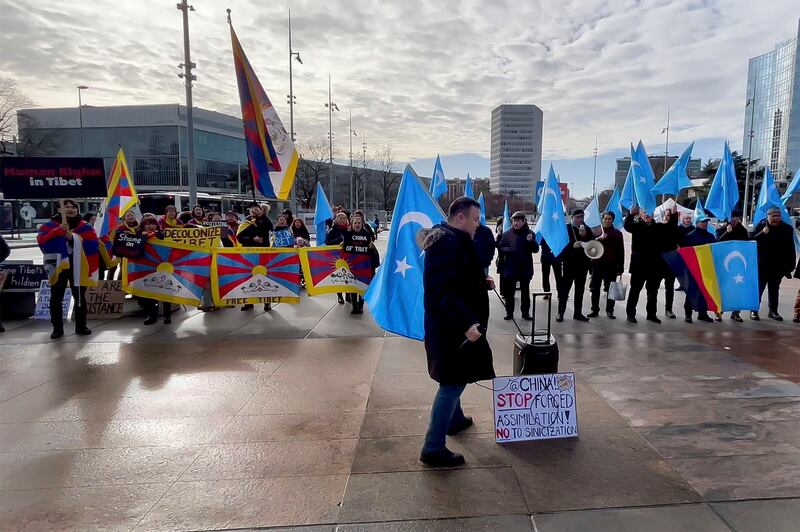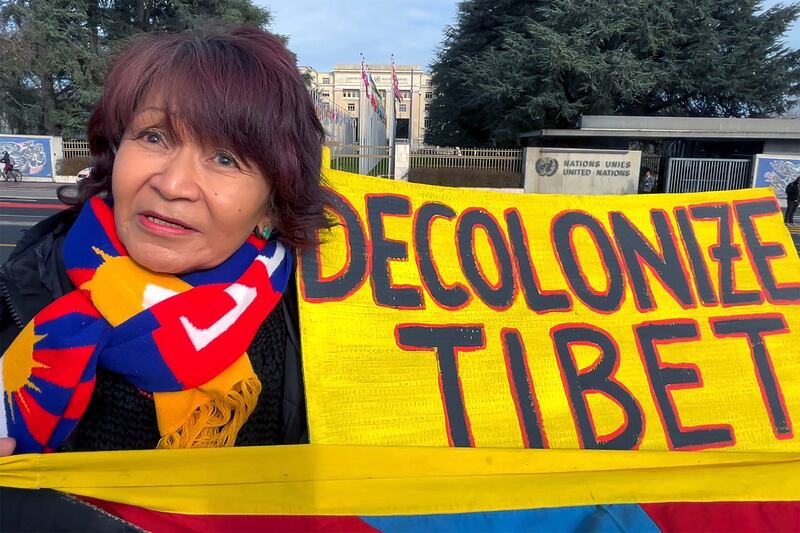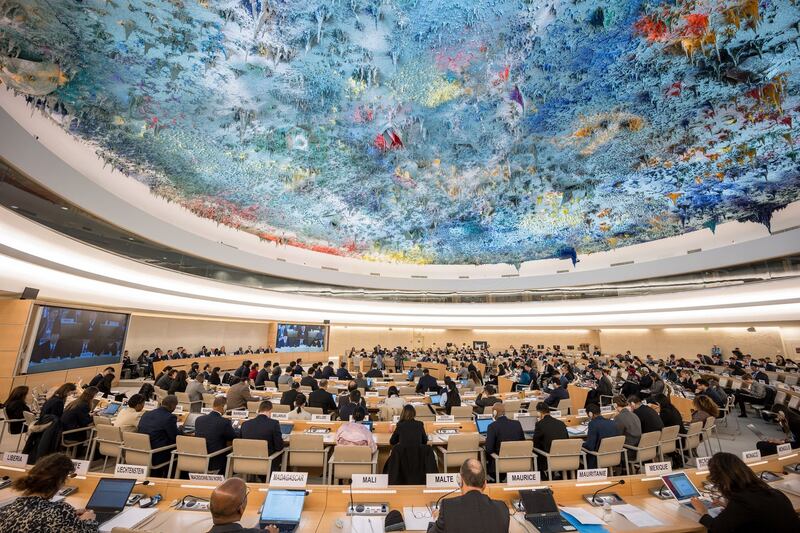A top Chinese diplomat said Beijing would “earnestly study” 428 recommendations for addressing human rights submitted by U.N. members, calling them “objective and balanced.”
But leading experts said China “gamed” the once-every-five-year “universal periodic review” to avoid scrutiny of its rights abuses.
Chen Xu, China’s ambassador to the U.N. offices in Geneva, said following the adoption of the report that he was happy with the many recommendations by 141 countries, and that Beijing would release its positions on each of the suggestions next month.
“The report just adopted is, in general, objective and balanced, and has reflected the statements and the recommendations during the meeting,” Chen said in remarks to the council. “We believe the majority of the comments and recommendations are constructive.”
Tuesday's three-hour review session descended into farce, with the unusually high number of participating countries meaning each only had 45 seconds to provide an assessment of a country that has been accused of possible crimes against humanity by a U.N. body.
Under this process, each of the 193 U.N. member states has their rights record reviewed on a rolling five-year basis.
A report by Reuters said Chinese diplomats had in the lead-up to the session lobbied countries to turn up with soft-ball assessments.
Gaming the system
The many contributions during Tuesday’s session worked to draw attention away from some of the worst claims of rights abuse in China, including the treatment of Uyghurs, Tibetans and Hong Kongers.

While Western nations including the United States, Finland, Canada, Switzerland and the United Kingdom focussed on China’s treatment of Tibetans and Uyghurs in the country’s west during their 45 seconds, many countries offered praise for things like legal system reforms.
William Nee, the research and advocacy coordinator for the Washington-based Chinese Human Rights Defenders, said Beijing had used its diplomatic heft to water-down legitimate criticism of its human rights record by inundating the process with friendly voices.
“This time, they tried to game the process,” Nee told Radio Free Asia. “There was an intense lobbying campaign for countries to ask questions that essentially the Chinese government wrote in advance. There were a lot of softball questions and very easy questions.”
Nee added that some countries’ recommendations even appeared to poke fun at the global condemnation of the China’s treatment of Tibetans and Uyghur citizens, the latter of whom the U.S. government says are the victim of an ongoing campaign of genocide.

Russia, he noted, said China should “improve gradually people’s sense and ability of using standard spoken and written Chinese language in Xinjiang,” referring to the far-western region where Uyghurs live.
Venezuela, meanwhile, said China must "firmly oppose the politicization" of human rights "under the pretext of issues related to Xinjiang, Hong Kong and Xizang," the latter of which is the new official romanized name for Tibet adopted by the Chinese government.
“If we look at the advanced questions submitted, it seems as though some of those questions could have been drafted by the Chinese government, to be quite blunt,” said Kai Müller, executive director and head of U.N. advocacy at the International Campaign for Tibet.
Nothing new
Sophie Richardson, the former China director at Human Rights Watch, told RFA that China openly flouted U.N. requirements to allow input from independent civil society groups into the self-report it submits.
“There’s a long list of ways the Chinese government tried to game the process this time around, which has to start with the way it tried to game the process the last time around,” Richardson said, pointing to China’s boasting of its fidelity to recommendations made in 2018.
China that year accepted 284 of the 346 recommendations made by some 150 countries. But many of those, Richardson said, were the ones that were “vague or meaningless, or in fact encouraged the Chinese government to keep committing human rights violations.”
“Beijing has held that up as real progress,” she said, even though “five years later, we know it is committing atrocity crimes.”

But China’s “gaming” of the review process did not entirely wipe out opportunities for countries to speak out about their legitimate concerns.
There was a heightened focus, for example, on the plight of Tibetans and Uyghurs, with the number of recommendations related to Tibet increasing to 24 from 10 in 2018. Likewise, the number of countries mentioning Tibet in their floor speeches doubled from nine to 20.
“The dramatic increase in the number of U.N. member states who spoke out for Tibet … speaks to the existential threat China’s assimilationist policies pose to the Tibetan people,” said Lhadon Tethong, the director of the Tibet Action Institute.
Campaign for Uyghurs executive director Rushan Abbas said the 30 countries who called out human rights abuses against Uyghurs showed that the world was no longer being fooled by China’s denials.
“This significant outcry, despite China’s persistent lies and outright denial, stands as a testament to the commitment to human rights and justice,” Abbas said. “It also sends a powerful message that the international community will not be swayed by false narratives in light of the mounting evidence exposing the crimes of the PRC.”
China has until Feb. 9, 2024 to provide its initial written response to each of the recommendations, including whether it accepts them, and has until Feb. 16 to finalize its statements and response.
Edited by Alex Willemyns and Malcolm Foster.
